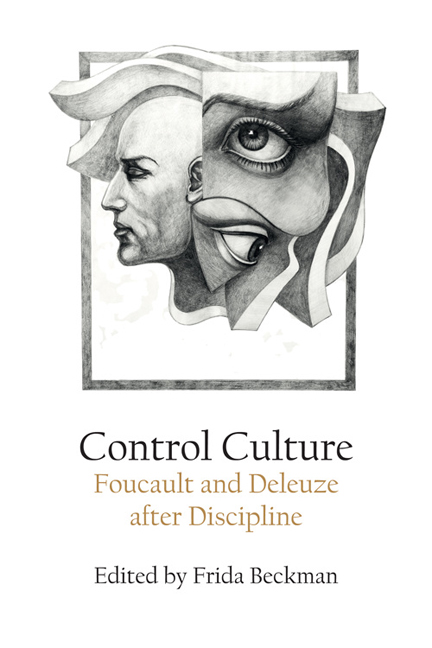Book contents
- Frontmatter
- Contents
- Acknowledgements
- Notes on Contributors
- Introduction. Control of What?
- 1 Notes from an Investigation of ‘Control Society’
- 2 Post-Mortem on Race and Control
- 3 Periodising (with) Control
- 4 Subjects of Sovereign Control and the Art of Critique in the Early Modern Period
- 5 Posthumanism, Social Complexity and the Political: A Genealogy for Foucault’s The Birth of Biopolitics
- 6 ‘That Path is for Your Steps Alone’: Popular Music, Neoliberalism and Biopolitics
- 7 Cinema in the Age of Control
- 8 Towards a ‘Minor’ Fascism: Panoptic Control and Resistant Multiplicity in TV’s Spooks
- 9 Species States: Animal Control in Phil Klay’s ‘Redeployment’
- 10 Control and a Minor Literature
- 11 Philosophy and Control
- Index
1 - Notes from an Investigation of ‘Control Society’
Published online by Cambridge University Press: 05 May 2021
- Frontmatter
- Contents
- Acknowledgements
- Notes on Contributors
- Introduction. Control of What?
- 1 Notes from an Investigation of ‘Control Society’
- 2 Post-Mortem on Race and Control
- 3 Periodising (with) Control
- 4 Subjects of Sovereign Control and the Art of Critique in the Early Modern Period
- 5 Posthumanism, Social Complexity and the Political: A Genealogy for Foucault’s The Birth of Biopolitics
- 6 ‘That Path is for Your Steps Alone’: Popular Music, Neoliberalism and Biopolitics
- 7 Cinema in the Age of Control
- 8 Towards a ‘Minor’ Fascism: Panoptic Control and Resistant Multiplicity in TV’s Spooks
- 9 Species States: Animal Control in Phil Klay’s ‘Redeployment’
- 10 Control and a Minor Literature
- 11 Philosophy and Control
- Index
Summary
My title, of course, is an allusion to Althusser's famous meditation on the ‘Ideological State Apparatus’ (ISA), which will inform the following investigation of Deleuze's (and Guattari’s) theory of the mechanism of control. As I have argued elsewhere, this allusion is not extraneous, since there is an internal and technical relationship between the two mechanisms (or dispositifs, employing Foucault's concept); therefore, Deleuze's programme to identify the sociopolitical mechanisms of control that are in the process of replacing the technical machines of disciplinary society can basically be understood as an updating of Althusser's earlier programme of ideological interpellation to forecast an emerging assemblage of power relations. Nevertheless, in the following investigation I will argue that this teleology cannot be applied in a wholesale manner to analyse the political and social transformations of contemporary neoliberal society, which is how Deleuze's early sketch has so often been employed, since it contains an element of science fiction that spoils any direct application to the concrete phenomenon.
In order to grasp this generic element, it seems fitting to begin our investigation with the following scenario: ‘Picture a man, one Mr. Leonard Mead, unemployed writer, who goes out for a stroll after dinner – ‘at 8 o’clock on a misty evening in November’ – in 2053 and is arrested for ‘just walking.’ In ‘7000 B.C.: Apparatus of Capture’ (which appears in A Thousand Plateaus six years before the ‘Postscript on Control Societies’) Deleuze and Guattari employ this plot from Ray Bradbury's short story ‘The Pedestrian’ (1951; see Bradbury 1953) to first describe what they call a ‘new machinic form of enslavement’ that was replacing the earlier technical forms of subjection (i.e., disciplinary techniques). The story portrays an individual who is out for a walk in the moonlit night, posed against the background of a Kafkaesque village of darkened homes, the only signs of life being the ghostly light of the television flickering in the windows of each enclosure, as if linking them together in a larger apparatus composed of both human and technical parts.
- Type
- Chapter
- Information
- Control CultureFoucault and Deleuze after Discipline, pp. 20 - 33Publisher: Edinburgh University PressPrint publication year: 2018



